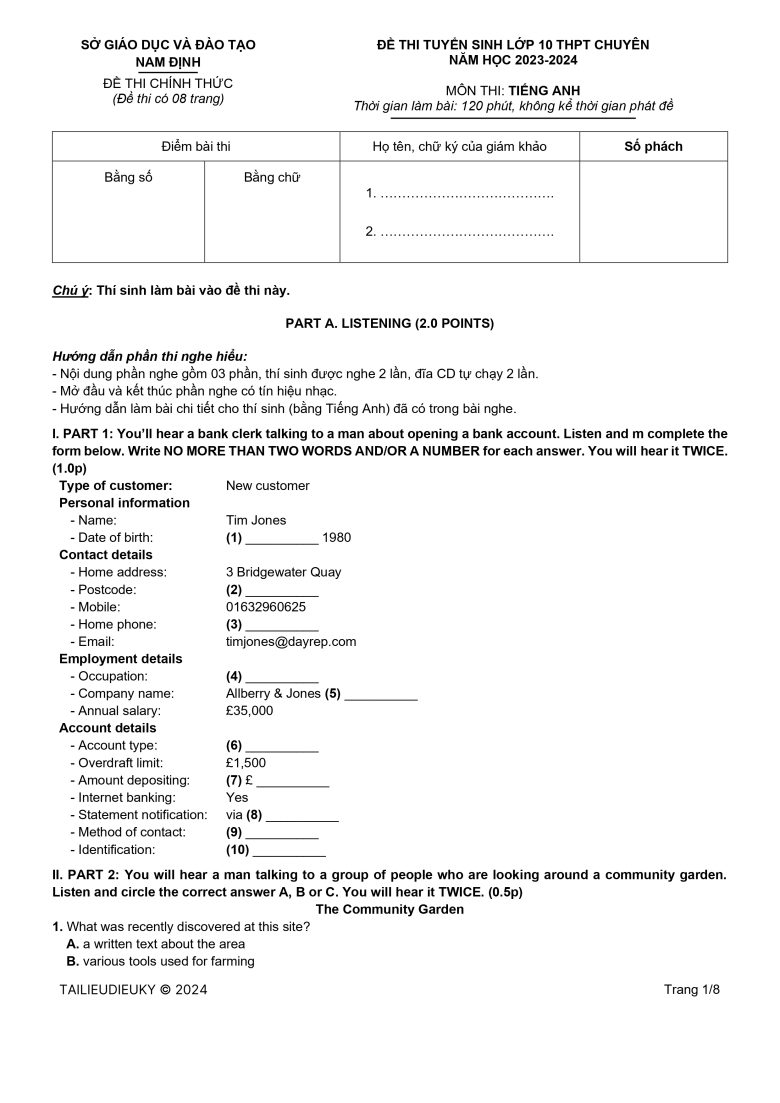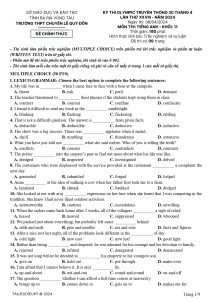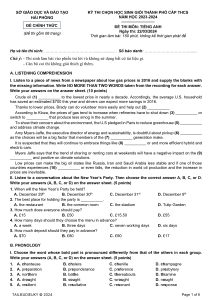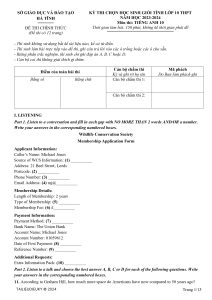Tài liệu diệu kỳ xin giới thiệu Đề thi chuyên Tiếng Anh Lê Hồng Phong, Nam Định năm học 2023-2024 gồm đầy đủ đề thi, file nghe và đáp án (hướng dẫn chấm chính thức) từ Sở GD&ĐT Nam Định. Tài liệu có thể tải xuống file word và pdf để ôn luyện cho kỳ thi năm 2025-2026. Bài thi dành cho các thí sinh có nguyện vọng thi vào lớp 10 THPT chuyên Lê Hồng Phong lớp chuyên Tiếng Anh kết hợp với 3 môn thi bắt buộc gồm Toán, Ngữ văn và Ngoại ngữ (chung, dành cho tất cả thí sinh).
Theo thông tin từ Sở GD&ĐT Nam Định cho hay, toàn tỉnh Nam Định có 22.782 thí sinh đăng ký dự Kỳ thi tuyển sinh vào lớp 10 THPT công lập hệ không chuyên năm học 2023-2024.
Đề thi môn Tiếng Anh (chuyên) năm nay gồm 08 trang. Thời gian làm bài 120 phút không kế thời gian phát đề.
Đề thi được chia làm 05 phần chính, tổng điểm được tính trên thang điểm 10. bao gồm cả phần thi Speaking (diễn ra sau bài thi Viết).
A. Listening (2.0 points):
Part A of the listening test comprises three sections: completing a form for opening a bank account, choosing correct answers about a community garden, and filling in blanks in a lecture about Great Zimbabwe.
II. Grammar and Vocabulary (2.0 points):
Part B of the exam tests grammar and vocabulary through multiple-choice questions, word form exercises, and error identification. Candidates must select the correct options, provide appropriate word forms, and identify and correct errors in sentences.
III. Reading (2.5 points):
Part C includes four parts: a passage on South Carolina holidays with multiple-choice questions, a fill-in-the-blank exercise about language origins, comprehension questions about Mars conditions, and matching headings to paragraphs about sustainable construction.
IV. Writing (2.5 points):
In Part D, candidates rewrite sentences and complete others using given cues. Additionally, they write a 200-220-word essay expressing their views on the importance of parental roles in helping children deal with stress.
IV. Speaking (1 point):
The speaking test is conducted in monologue format. Firstly, candidates randomly select an envelope containing the exam question. Then they have 5 minutes to prepare and 2 minutes to present their answer via a recording device.
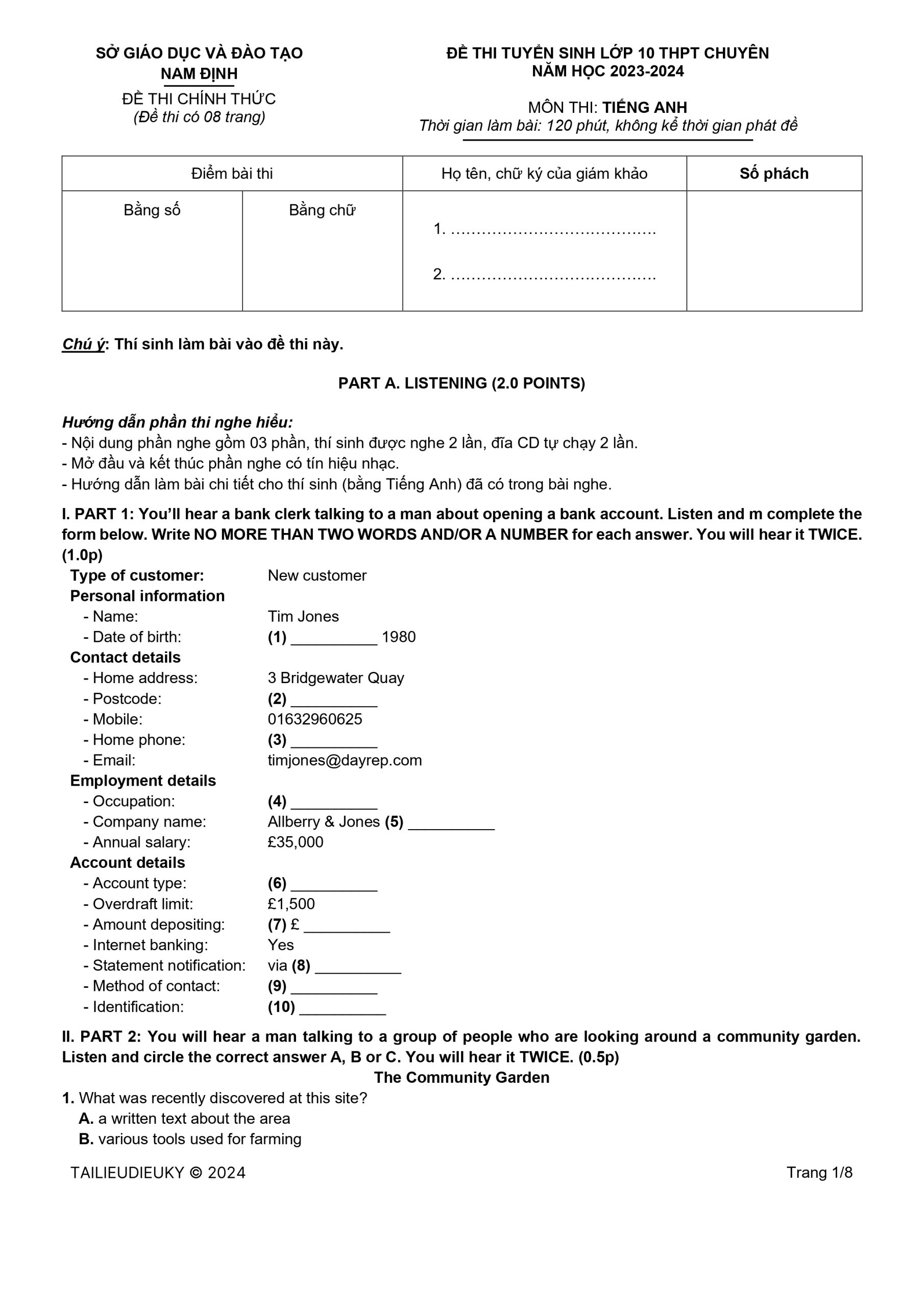
Đề thi chuyên Tiếng Anh Lê Hồng Phong, Nam Định năm học 2023-2024 - Trang 1/8
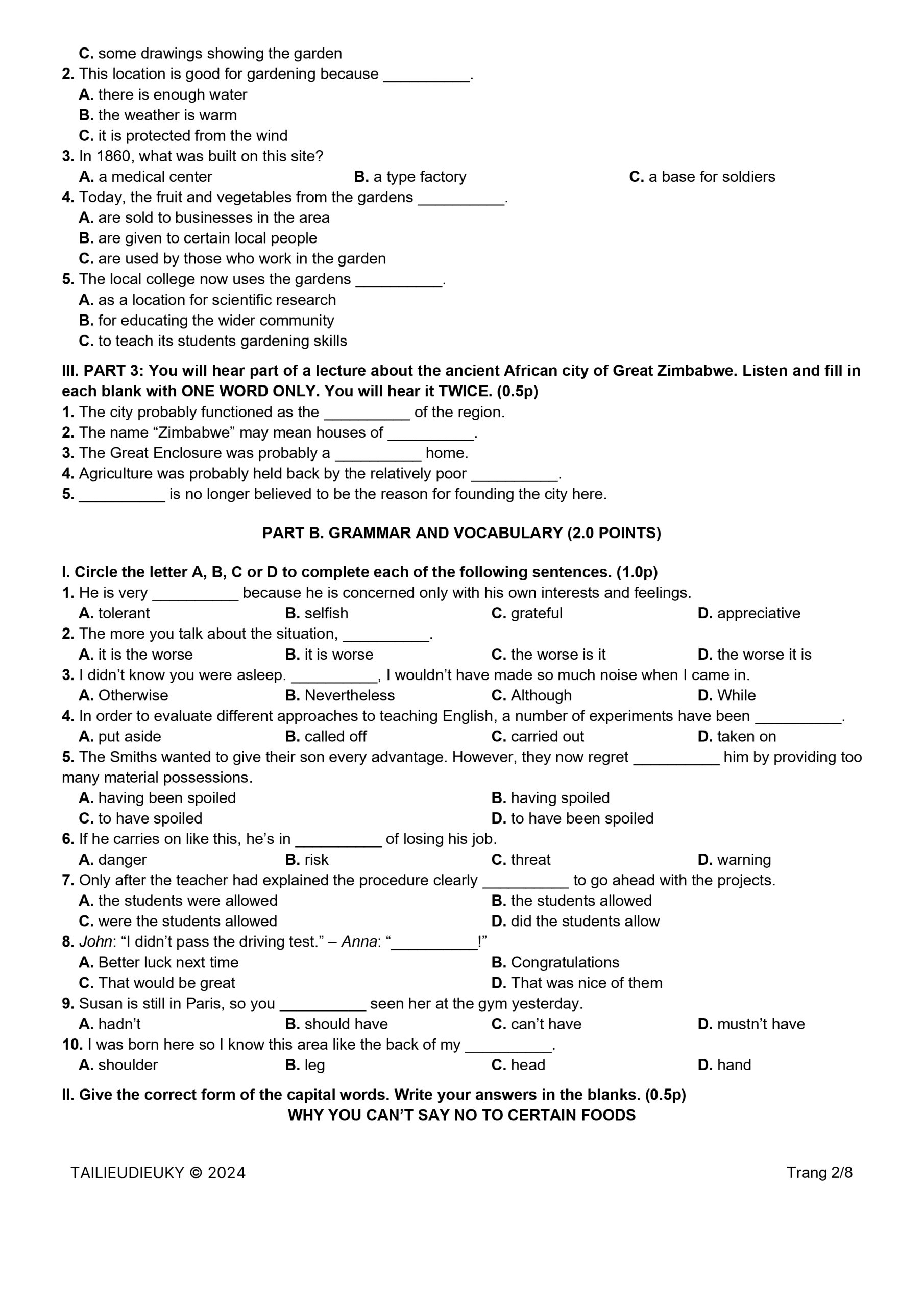
Đề thi chuyên Tiếng Anh Lê Hồng Phong, Nam Định năm học 2023-2024 - Trang 2/8
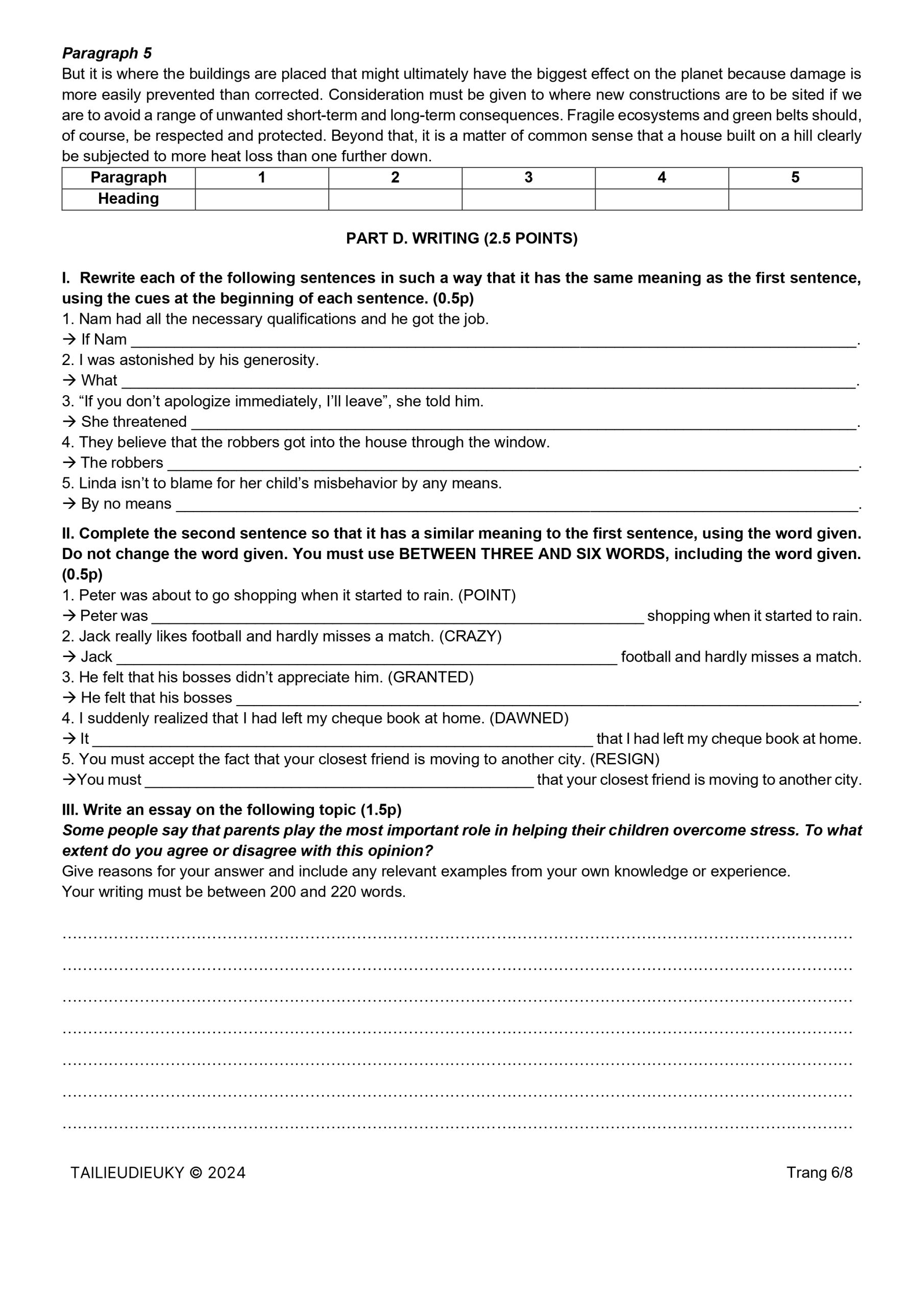
Đề thi chuyên Tiếng Anh Lê Hồng Phong, Nam Định năm học 2023-2024 - Trang 6/8
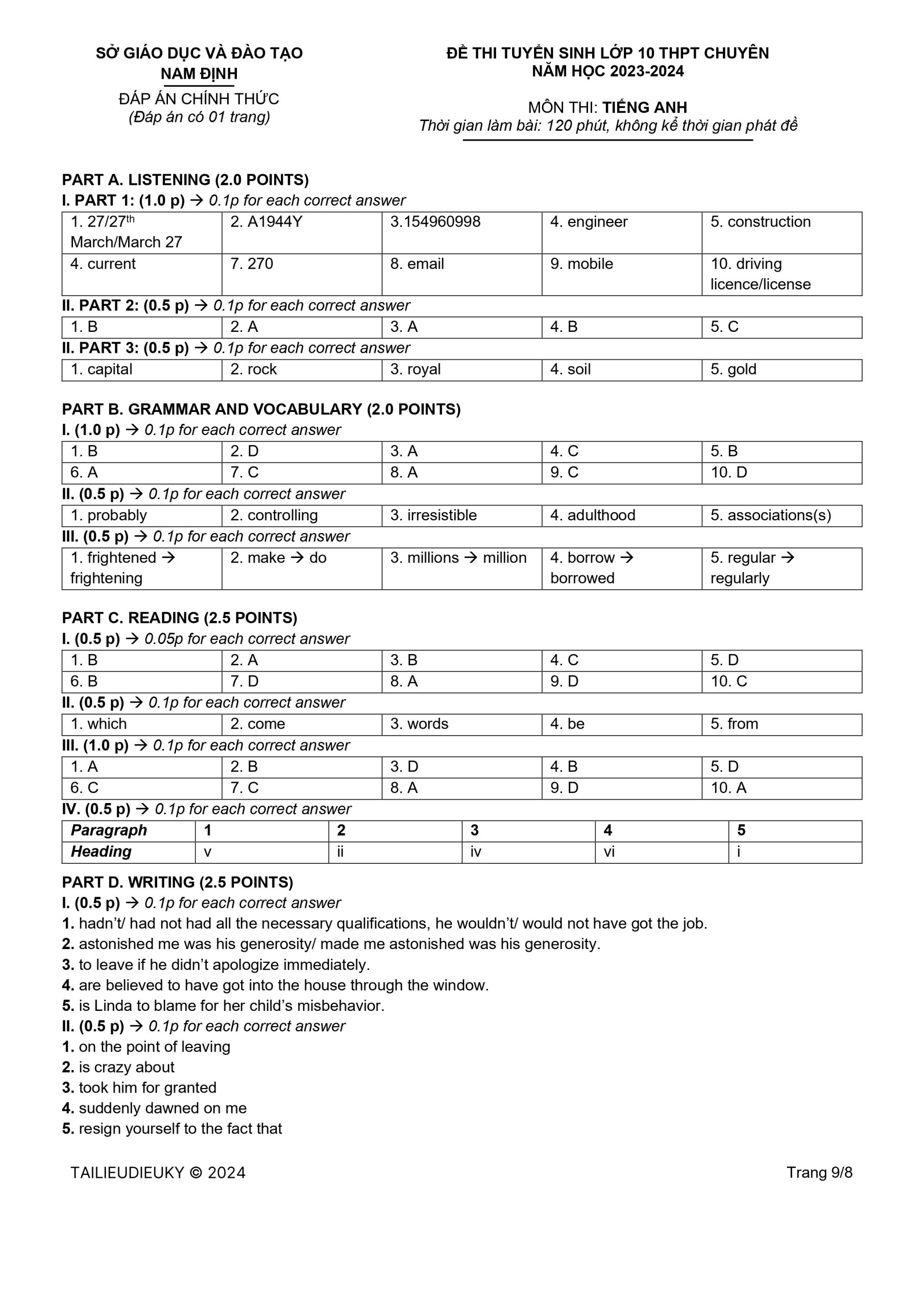
Đáp án chính thức - Đề thi chuyên Tiếng Anh Lê Hồng Phong, Nam Định năm học 2023-2024
Để ôn tập thật tốt cho Kỳ thi tuyển sinh lớp 10 năm học 2025-2026 sắp tới, quý thầy cô và các em học sinh có thể tham khảo các tài liệu, chuyên đề Tiếng Anh nâng cao khác tại trang Thư viện tài liệu tại website Tài liệu diệu kỳ và tải xuống các đề thi chuyên Anh các tỉnh/TP khác để có kế hoạch ôn tập hiệu quả.
Trích dẫn nội dung Đề thi chuyên Anh Nam Định năm học 2023-2024:
SỞ GIÁO DỤC VÀ ĐÀO TẠO
NAM ĐỊNH
ĐỀ THI CHÍNH THỨC
(Đề thi có 08 trang)
ĐỀ THI TUYỂN SINH LỚP 10 THPT CHUYÊN
NĂM HỌC 2023-2024
MÔN THI: TIẾNG ANH
Thời gian làm bài: 120 phút, không kể thời gian phát đề
Điểm bài thi Họ tên, chữ ký của giám khảo Số phách
Bằng số Bằng chữ 1. ………………………………….
2. ………………………………….
Chú ý: Thí sinh làm bài vào đề thi này.
PART A. LISTENING (2.0 POINTS)
Hướng dẫn phần thi nghe hiểu:
- Nội dung phần nghe gồm 03 phần, thí sinh được nghe 2 lần, đĩa CD tự chạy 2 lần.
- Mở đầu và kết thúc phần nghe có tín hiệu nhạc.
- Hướng dẫn làm bài chi tiết cho thí sinh (bằng Tiếng Anh) đã có trong bài nghe.
I. PART 1: You’ll hear a bank clerk talking to a man about opening a bank account. Listen and m complete the form below. Write NO MORE THAN TWO WORDS AND/OR A NUMBER for each answer. You will hear it TWICE. (1.0p)
Type of customer: New customer
Personal information
- Name: Tim Jones
- Date of birth: (1) __________ 1980
Contact details
- Home address: 3 Bridgewater Quay
- Postcode: (2) __________
- Mobile: 01632960625
- Home phone: (3) __________
- Email: timjones@dayrep.com
Employment details
- Occupation: (4) __________
- Company name: Allberry & Jones (5) __________
- Annual salary: £35,000
Account details
- Account type: (6) __________
- Overdraft limit: £1,500
- Amount depositing: (7) £ __________
- Internet banking: Yes
- Statement notification: via (8) __________
- Method of contact: (9) __________
- Identification: (10) __________
II. PART 2: You will hear a man talking to a group of people who are looking around a community garden. Listen and circle the correct answer A, B or C. You will hear it TWICE. (0.5p)
The Community Garden
1. What was recently discovered at this site?
A. a written text about the area
B. various tools used for farming
C. some drawings showing the garden
2. This location is good for gardening because __________.
A. there is enough water
B. the weather is warm
C. it is protected from the wind
3. In 1860, what was built on this site?
A. a medical center B. a type factory C. a base for soldiers
4. Today, the fruit and vegetables from the gardens __________.
A. are sold to businesses in the area
B. are given to certain local people
C. are used by those who work in the garden
5. The local college now uses the gardens __________.
A. as a location for scientific research
B. for educating the wider community
C. to teach its students gardening skills
III. PART 3: You will hear part of a lecture about the ancient African city of Great Zimbabwe. Listen and fill in each blank with ONE WORD ONLY. You will hear it TWICE. (0.5p)
1. The city probably functioned as the __________ of the region.
2. The name “Zimbabwe” may mean houses of __________.
3. The Great Enclosure was probably a __________ home.
4. Agriculture was probably held back by the relatively poor __________.
5. __________ is no longer believed to be the reason for founding the city here.
PART B. GRAMMAR AND VOCABULARY (2.0 POINTS)
I. Circle the letter A, B, C or D to complete each of the following sentences. (1.0p)
1. He is very __________ because he is concerned only with his own interests and feelings.
A. tolerant B. selfish C. grateful D. appreciative
2. The more you talk about the situation, __________.
A. it is the worse B. it is worse C. the worse is it D. the worse it is
3. I didn’t know you were asleep. __________, I wouldn’t have made so much noise when I came in.
A. Otherwise B. Nevertheless C. Although D. While
4. In order to evaluate different approaches to teaching English, a number of experiments have been __________.
A. put aside B. called off C. carried out D. taken on
5. The Smiths wanted to give their son every advantage. However, they now regret __________ him by providing too many material possessions.
A. having been spoiled B. having spoiled
C. to have spoiled D. to have been spoiled
6. If he carries on like this, he’s in __________ of losing his job.
A. danger B. risk C. threat D. warning
7. Only after the teacher had explained the procedure clearly __________ to go ahead with the projects.
A. the students were allowed B. the students allowed
C. were the students allowed D. did the students allow
8. John: “I didn’t pass the driving test.” – Anna: “__________!”
A. Better luck next time B. Congratulations
C. That would be great D. That was nice of them
9. Susan is still in Paris, so you __________ seen her at the gym yesterday.
A. hadn’t B. should have C. can’t have D. mustn’t have
10. I was born here so I know this area like the back of my __________.
A. shoulder B. leg C. head D. hand
II. Give the correct form of the capital words. Write your answers in the blanks. (0.5p)
WHY YOU CAN’T SAY NO TO CERTAIN FOODS
Are you a chocoholic or a fast-food addict? Don’t blame yourself - certain foods can trigger an eating binge, but there are ways to control the (0. CRAVE) ___cravings___.
Even if you’re a fairly disciplined eater, there are sure to be foods you’ll have no resistance to. For some it’s a bar of chocolate, for others a burger. You (1. PROBABILITY) ____________ think there’s no one to blame but your weak-willed self.
But the reassuring truth is that when it comes to (2. CONTROL) ____________ your junk food intake, the odds are heavily stacked against you. High fat, high-sugar foods can act like an addictive drug, making us crave even more of the same. Fat is often added to food to make it more palatable so it’s a good way of making inexpensive, bland food seem tastier. Another reason certain foods are so (3. RESIST) ____________ is that they have a very real effect on our mood, making us feel more relaxed.
Our eating habits develop when we are young and as we move into (4. ADULT) ____________, the chocolate that we were rewarded with as a young child becomes a guilty indulgence. We might feel we’ve earned the right to treat ourselves after a hard day at work, for example. Past (5. ASSOCIATE) ____________ can reinforce bad eating habits that are difficult to break free from.
III. Each of the following sentences has ONE word that needs correction. Underline that word and correct it by replacing it with ONE proper word. Write the correction in the provided blank on the right. There is an example at the beginning (0). (0.5p)
Sentences Corrections
0. He collided with a car because he was driving too fastly. fast
1. Public speaking is quite a frightened experience for many people.
2. Some robots may make the washing-up and keep the house clean.
3. Social networking sites are estimated to have over 700 millions users worldwide.
4. The book which you borrow from the city library yesterday is very interesting.
5. Some bacteria are extremely harmful, but others are regular used in producing foods.
PART C. READING (2.5 POINTS)
I. Read the text and circle A, B, C or D that best fits each space. (0.5p) Holidays in South Carolina
Roaring across the bay in a motorized rubber boat, we were told by the captain to keep our eyes open. With the engine turned (1) __________, it wasn’t long before half a dozen dolphins came swimming around us. Eventually, two came up right beside the boat and popped their heads out of the water to give us a wide grin.
Dolphin watching is just one of the (2) __________ unexpected attractions of a holiday in South Carolina, in the USA. The state has long been popular with golfers and, with dozens of courses in the area, it is (3) __________ a golfer’s paradise. But even the keenest golfer needs other divisions and we soon found the resorts had plenty to offer.
In fact, Charleston, (4) __________ is midway along the coast, is one of the most interesting cities in the USA, and is where the first shots in the Civil War were (5) __________. Taking a guided horse and carriage tour through the quiet back streets you get a real (6) __________ of the city’s past. Strict regulations apply to buildings so that original (7) __________ are preserved. South of Charleston lies Hilton Head, an island resort about 18 km long and shaped (8) __________ a foot. It has a fantastic sandy beach (9) __________ the length of the island and this is perfect for all manner of water sports. Alternatively, if you feel like doing nothing, (10) __________ a chair and umbrella, head for an open space and just sit back and watch the pelicans diving for fish.
1. A. up B. off C. into D. away
2. A. many B. much C. little D. lots
3. A. fully B. truly C. honestly D. purely
4. A. where B. that C. which D. who
5. A. thrown B. aimed C. pulled D. fired
6. A. significance B. sense C. importance D. comprehension
7. A. points B. particles C. factors D. features
8. A. like B. as C. so D. similar
9. A. lying B. going C. following D. running
10. A. charge B. lend C. hire D. loan
II. Fill in each blank with ONE suitable word. Write the words in the spaces provided. (0.5p)
The truth is nobody really knows how the language first began. Did we all start talking at around the same time because of the manner in (1) ____________ our brains had begun to develop?
Although there is a lack of clean evidence, people have (2) ____________ up with various theories about the origins of language. One recent theory is that human beings have evolved in such a way that we are programmed for language from the moment of birth. In other (3) ____________, language came about as a result of an evolutionary change in our brains at some stage.
Language can well (4) ____________ programmed into the brain but, despite this, people still need stimulus from others around them. From studies, we know that if children are isolated (5) ____________ human contact and have not learnt to construct sentences before they are ten, it is doubtful they will ever do so. This research shows, if nothing else, that language is a social activity, not something invented in isolation.
III. Read the following passage and circle the letter A, B, C, or D to indicate the correct answer to each of the questions. (1.0p)
According to the best evidence gathered by space probes and astronomers, Mars is an inhospitable planet, more similar to Earth’s Moon than to Earth itself - a dry, stark, seemingly lifeless world. Mars’ air pressure is equal to Earth’s at an altitude of 100,000 feet. The air there is 95 percent carbon dioxide.
Mars has no ozone layer to screen out the sun’s lethal radiation. Daytime temperatures may reach above freezing, but because the planet is blanketed by the mere wisp of an atmosphere, the heat radiates back into space. Even at the equator, the temperature drops to -50C (-60F) at night. Today there is no liquid water, although valleys and channels on the surface show evidence of having been carved by running water. The polar ice caps are made of frozen water and carbon dioxide, and water may be frozen in the ground as permafrost.
Despite these difficult conditions, certain scientists believe that there is a possibility of transforming Mars into a more Earth-like planet. Nuclear reactors might be used to melt frozen gases and eventually build up the atmosphere. This in turn could create a “greenhouse effect” that would stop heat from radiating back into space. Liquid water could be thawed to form a polar ocean. Once enough ice has melted, suitable plants could be introduced to build up the level of oxygen in the atmosphere so that, in time, the planet would support animal life from Earth and even permanent human colonies. “This was once thought to be so far in the future as to be irrelevant,” said Christopher McKay, a research scientist at NASA. “But now it’s starting to look practical. We could begin work in four or five decades.”
The idea of “terra-forming” Mars, as enthusiasts call it, has its roots in science fiction. But as researchers develop a more profound understanding of how Earth’s ecology supports life, they have begun to see how it may be possible to create similar conditions on Mars. Don’t plan on homesteading on Mars any time soon, though. The process could take hundreds or even thousands of years to complete and the cost would be staggering.
1. What does the passage mainly discuss?
A. The possibility of changing the Martian environment
B. The challenge of space travel
C. The advantages of establishing colonies on Mars
D. The need to study the Martian colony
2. The word “stark” in paragraph 1 is closest in meaning to __________.
A. unknown B. harsh C. dark D. friendly
3. According to the passage, the Martian atmosphere today consists mainly of __________.
A. oxygen B. ozone C. water vapor D. carbon dioxide
4. Which of the following is NOT listed as a characteristic of the planet Mars that would make colonization difficult?
A. There is no liquid water.
B. Daytime temperatures are dangerously high.
C. The sun’s rays are deadly.
D. Nighttime temperatures are extremely low.
5. It can be inferred from paragraph 3 that the “greenhouse effect” is __________.
A. the direct result of nuclear reactions
B. the cause of low temperatures on Mars
C. caused by the introduction of green plants
D. possible means of warming Mars
6. The word “permanent” in paragraph 3 is closest in meaning to __________.
A. temporary B. short C. lasting D. famous
7. According to Christopher McKay, the possibility of transforming Mars __________
A. could only occur in science fiction stories
B. will not begin for hundreds, even thousands of years
C. could be started in forty or fifty years
D. is completely impractical
8. The phrase “more profound” in paragraph 4 is closest in meaning to __________.
A. deeper B. more modern C. brighter D. more difficult
9. The word “they” in paragraph 4 refers to __________.
A. Mars B. enthusiasts C. roots D. more difficult
10. According to the passage, the basic knowledge needed to transform Mars comes from __________.
A. a knowledge of Earth’s ecology B. the science of astronomy
C. data from space probes D. science fiction stories
IV. Choose the correct heading for paragraphs 1-5 from the list of headings below. Write your answers in the boxes provided. (0.5 p)
List of Headings
i. Location is everything
ii. Installing the right technology
iii. Pollution - the number one problem
iv. Preventing waste
v. Ways to motivate developers
vi. Exploiting the good and avoiding the bad
vii. The importance of size
viii. Cutting the cost of building
The need for houses for a growing population often seems to be at odds with the need to protect the environment. James Chilton looks at how best to satisfy both of these needs.
Paragraph 1
The thing is, sustainable development can be achieved relatively easily so long as the industry can be persuaded to follow certain guidelines and adopt regulations; in short, to care about the environment. This might initially eat into their profits, which is why construction companies often need to be persuaded. Strict laws, fashionable green movements (and public shaming of builders who disregard them) and peer pressure within the industry all contribute to ethical policies and principles. If developers can, at the same time, be made to feel proud of their environmentally-friendly initiatives, then this is an extra incentive for them to care.
Paragraph 2
Our homes need to be built in such a way that, however rich we are, or however little we care about the planet, it is impossible to do too much damage in terms of using up our energy resources or generating emissions. This means that heating, cooling and hot water provision must be as fuel efficient as possible. Solar, wind or geothermal technology must be used as standard so that the greatest possible proportion of renewable energy is used, and temperatures must be correctly regulated by the use of thermostats. In addition to this, cooking appliances, light fittings and bulbs should take into consideration the range of sensors, timers and other economy products we now have available.
Paragraph 3
Once all the above have been taken care of, it remains for designers to stop the energy from being lost, and that means insulation. The latest thinking is to steer clear of the potentially harmful side-effects of more traditional materials such as fibre glass in favor of insulation made from recycled newspaper, wool or even denim. A range of treatments exists to improve the thermal qualities of glass, and, all in all, there is no reason why a new-build should lose more than a small fraction of the energy used to heat or cool it. Roofs should gather rainwater, to be stored and recycled. Water recycling, in the form of water-filtering plants, is an exciting prospect.
Paragraph 4
Orientation plays a big part in making the most of natural resources. It is something that has been practiced for thousands of years and learned, no doubt, the hard way. Even the briefest of studies of old constructions will reveal that they were positioned in such a way as to maximize sunlight in cold countries and shade in hot ones. Houses built end-on into the prevailing winds, houses built near fresh running water, walled gardens to shelter from the wind and trap the sun; all these are examples of working with nature and not against it. Passive solar design, as it is now known, involves orienting the house in a way that makes the best use of energy from the sun. This can, in certain cases, reduce energy consumption by 40%.
Paragraph 5
But it is where the buildings are placed that might ultimately have the biggest effect on the planet because damage is more easily prevented than corrected. Consideration must be given to where new constructions are to be sited if we are to avoid a range of unwanted short-term and long-term consequences. Fragile ecosystems and green belts should, of course, be respected and protected. Beyond that, it is a matter of common sense that a house built on a hill clearly be subjected to more heat loss than one further down.
Paragraph 1 2 3 4 5
Heading
PART D. WRITING (2.5 POINTS)
I. Rewrite each of the following sentences in such a way that it has the same meaning as the first sentence, using the cues at the beginning of each sentence. (0.5p)
1. Nam had all the necessary qualifications and he got the job.
=> If Nam ____________________________________________________________________________________.
2. I was astonished by his generosity.
=> What _____________________________________________________________________________________.
3. “If you don’t apologize immediately, I’ll leave”, she told him.
=> She threatened _____________________________________________________________________________.
4. They believe that the robbers got into the house through the window.
=> The robbers ________________________________________________________________________________.
5. Linda isn’t to blame for her child’s misbehavior by any means.
=> By no means _______________________________________________________________________________.
II. Complete the second sentence so that it has a similar meaning to the first sentence, using the word given. Do not change the word given. You must use BETWEEN THREE AND SIX WORDS, including the word given. (0.5p)
1. Peter was about to go shopping when it started to rain. (POINT)
=> Peter was _________________________________________________________ shopping when it started to rain.
2. Jack really likes football and hardly misses a match. (CRAZY)
=> Jack __________________________________________________________ football and hardly misses a match.
3. He felt that his bosses didn’t appreciate him. (GRANTED)
=> He felt that his bosses ________________________________________________________________________.
4. I suddenly realized that I had left my cheque book at home. (DAWNED)
=> It __________________________________________________________ that I had left my cheque book at home.
5. You must accept the fact that your closest friend is moving to another city. (RESIGN)
=>You must _____________________________________________ that your closest friend is moving to another city.
III. Write an essay on the following topic (1.5p)
Some people say that parents play the most important role in helping their children overcome stress. To what extent do you agree or disagree with this opinion?
Give reasons for your answer and include any relevant examples from your own knowledge or experience.
Your writing must be between 200 and 220 words.
---------- HẾT ----------
SỞ GIÁO DỤC VÀ ĐÀO TẠO
NAM ĐỊNH
ĐÁP ÁN CHÍNH THỨC
(Đáp án có 01 trang)
ĐỀ THI TUYỂN SINH LỚP 10 THPT CHUYÊN
NĂM HỌC 2023-2024
MÔN THI: TIẾNG ANH
Thời gian làm bài: 120 phút, không kể thời gian phát đề
PART A. LISTENING (2.0 POINTS)
I. PART 1: (1.0 p) => 0.1p for each correct answer
1. 27/27th March/March 27 2. A1944Y 3.154960998 4. engineer 5. construction
4. current 7. 270 8. email 9. mobile 10. driving licence/license
II. PART 2: (0.5 p) => 0.1p for each correct answer
1. B 2. A 3. A 4. B 5. C
II. PART 3: (0.5 p) => 0.1p for each correct answer
1. capital 2. rock 3. royal 4. soil 5. gold
PART B. GRAMMAR AND VOCABULARY (2.0 POINTS)
I. (1.0 p) => 0.1p for each correct answer
1. B 2. D 3. A 4. C 5. B
6. A 7. C 8. A 9. C 10. D
II. (0.5 p) => 0.1p for each correct answer
1. probably 2. controlling 3. irresistible 4. adulthood 5. associations(s)
III. (0.5 p) => 0.1p for each correct answer
1. frightened => frightening 2. make => do 3. millions => million 4. borrow => borrowed 5. regular => regularly
PART C. READING (2.5 POINTS)
I. (0.5 p) => 0.05p for each correct answer
1. B 2. A 3. B 4. C 5. D
6. B 7. D 8. A 9. D 10. C
II. (0.5 p) => 0.1p for each correct answer
1. which 2. come 3. words 4. be 5. from
III. (1.0 p) => 0.1p for each correct answer
1. A 2. B 3. D 4. B 5. D
6. C 7. C 8. A 9. D 10. A
IV. (0.5 p) => 0.1p for each correct answer
Paragraph 1 2 3 4 5
Heading v ii iv vi i
PART D. WRITING (2.5 POINTS)
I. (0.5 p) => 0.1p for each correct answer
1. hadn’t/ had not had all the necessary qualifications, he wouldn’t/ would not have got the job.
2. astonished me was his generosity/ made me astonished was his generosity.
3. to leave if he didn’t apologize immediately.
4. are believed to have got into the house through the window.
5. is Linda to blame for her child’s misbehavior.
II. (0.5 p) => 0.1p for each correct answer
1. on the point of leaving
2. is crazy about
3. took him for granted
4. suddenly dawned on me
5. resign yourself to the fact that
MÔN THI: TIẾNG ANH – ĐỀ THI NÓI (SPEAKING TOPICS)
Question 1: What are the disadvantages of living in a big city?
Question 2: Why is it important to learn English?
Question 3: Talk about the eating habits of teenagers.
Question 4: Why do many people love travelling?
Question 5: What should students do to prepare for the future career?
Question 6: How to learn English effectively?
Question 7: What should students do to protect the environment?
Question 8: What are the benefits of living in a big city?
Question 9: What makes teenagers stressed?
Question 10: What are the advantages of developing tourism?
You have 5 minutes to prepare for your talk and 2 minutes to speak.
---------- HẾT ----------
